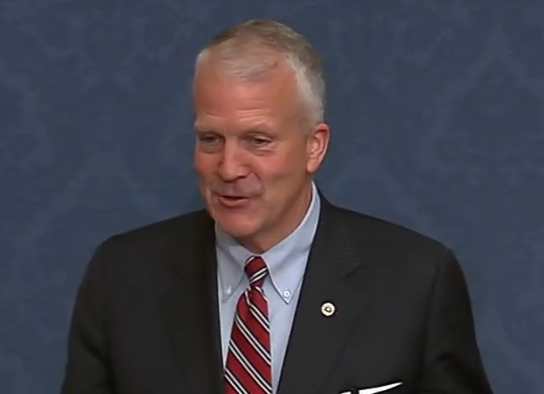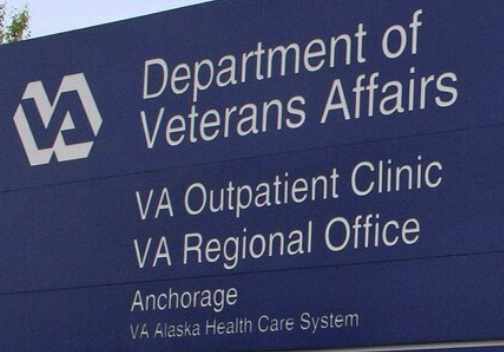WASHINGTON—U.S. Senator Dan Sullivan (R-Alaska), a member of the Senate Committee on Veterans’ Affairs (SVAC), welcomed the passage of his Senate resolution acknowledging the courage and sacrifice of veterans of the Vietnam War. The resolution also offered a long-overdue apology for the mistreatment many Vietnam veterans endured upon their return to the United States.
“58,000 members of the Armed Forces lost their lives in the Vietnam War. More than 300,000 Americans were wounded,” Sen. Sullivan said. “Yet many who served the United States bravely and faithfully were repeatedly targeted with shameful attacks when they came home. That never happened in our history before, and it should never happen again. This resolution lays out the heroic service of our Vietnam veterans and acknowledges their sacrifice and courage—it’s time they received their hero’s welcome.”
See below for the full transcript of Senator Sullivan’s remarks.
Mr. President, I am here on the floor today to ask unanimous consent for a long, long overdue resolution. It is a resolution that I guarantee most Americans are going to be like: What? Wait. What? We haven’t done that yet? The Senate, the Congress, hasn’t done that yet?
It is a resolution on this: recognizing the heroic service of our Vietnam veterans and finally issuing an apology— yes—for the way in which tens of thousands of them were treated when they came home after serving their Nation. So that is what I am going to do right here. I was told a couple of minutes ago that someone was going to object, and I was like: Whoa. Really? Let’s have that debate. Let’s have that debate.
But good news: no objection. So what I wanted to do briefly is just explain the reasoning behind this resolution. I think, as a country, when you look at the broad sweep of American history, we have always rightfully respected, lionized, and celebrated America’s veterans—think about it—in the last several decades.
The World War II generation—we even have a name for them: the ‘‘greatest generation’’—sacrificed over 400,000 Americans killed in action, saving the world from dictatorships in Europe and in the Pacific. The ‘‘greatest generation’’ literally defended freedom all over the world. When they came home—and to this day—we celebrated them, and we lionized them with ticker-tape parades, as it should be. At that moment in our history, the respect for our veterans was sky-high.
Then you had the Korean war, and unfortunately, in my view—I am a Korean war history buff, and I have studied this a lot—you had kind of an attitude of benign neglect. Even the phrase the ‘‘forgotten war,’’ which I don’t like—it should be called the noble war, actually—kind of indicates this benign neglect. The veterans came home. People didn’t really celebrate what they did. It wasn’t really like World War II. It was just kind of, OK, get on with your life; you did your duty. They sacrificed, of course, but there wasn’t a lot—it was kind of benign neglect, as I mentioned.
Then the Vietnam war happened, and we all know what happened, but to this day, I think most Americans maybe don’t even understand what happened, but there is no doubt our country went off-kilter, and the respect given to our servicemembers—World War II was certainly at the high level, even the Korean war with its benign neglect—this respect hit rock bottom. It hit rock bottom.
You know, it is just really sad. We all have heard stories of veterans coming home—corporals, enlisted guys, young officers. They did their duty. Some of them were drafted and said: It is my turn to go. For whatever reason—Vietnam was, of course, very contentious, but for whatever reason, when they came home, a lot of people in the American public took it out on them— slandered, spit upon, all kinds of horrible epitaphs.
I remember one of my first mess nights as a Marine officer—I was a brand new second lieutenant, and we had a mess night with a lot of these old retired marines—a very formal, sacred setting in many ways. One of the officers there talked about how he came home from Vietnam. His dad was a World War II vet. He had been in 12 months of combat. He came home to see his father. He hugged his dad. They were walking outside of the airport, and somebody threw red paint on him and his dad. Could you imagine that? You just sacrificed for your country. You are in uniform with your father, who is a World War II vet. What did we do that for? I don’t know if there is ever going to be an answer. But this happened literally to tens of thousands of Vietnam veterans. It shouldn’t have happened, but it did.
So what we can do here in the Senate is just say: Hey, we recognize your great service. It wasn’t easy. You were doing your duty. And if you were treated horribly—which a lot of them were when they came home—again, maybe you go attack President Johnson or President Nixon—not attack but criticize them—but why take it out on the lance corporal? That is what happened, and it shouldn’t have happened.
So what we can do here—and we are going to do it in a second. I am really glad no one is objecting. I hope no one is objecting. My resolution, S. Res. 778, has a lot of Senators supporting it. It is simply acknowledging the courage and sacrifice of our veterans from the Vietnam war and apologizing for the treatment that so many of them received when they came home—pretty simple—and welcoming them home, finally, from the U.S. Senate.
This resolution lays out their heroic service. It talks about the sacrifice. Mr. President, 58,000 members of the Armed Forces lost their lives. More than 300,000 Americans were wounded in Vietnam. Yet many who served bravely and faithfully to the United States during the Vietnam war were repeatedly targeted with shameful attacks when they came home. Why? I don’t know. That never really happened in our history before, and it should never happen again.
Here is the beautiful thing about our Vietnam vets: Instead of being wracked and incapacitated by bitterness or anger, our Vietnam veterans—and I have seen it throughout my career in the military—when they came home, they said: Here is what we are going to do. We were treated really poorly. We are going to work really hard to make sure that the next generations of veterans who serve overseas aren’t treated poorly, that we get back to this level of World War II treatment.
Guess what. The Vietnam vets succeeded in that. The vast majority of Americans look at our veterans— whether they agreed with the war in Iraq or Afghanistan or anywhere else, when they see the vets, they say: Thank you for your heroic service. We may not have liked the war, but we are certainly not going to take it out on you, lieutenant or corporal.
That group—our Vietnam vets—had a lot to do with us getting back to that level.
I saw this throughout my entire military career. I just retired out of the Marine Corps a few months ago after 30 years. I will give you one example. I had a sergeant from one of my Marine Recon units who was killed by an avalanche in Alaska—a great guy. So we were having a service to bury him. It was very somber. I was just a captain, but I was the lead officer overseeing this service. These guys pulled up on motorcycles—Vietnam vets. There were like five of them at this service, just sitting there.
After the service, they came up to me. I said: Hey, thank you, guys, for coming to the service of my sergeant. I said: Did you know him? No, we didn’t know him. We just saw that he was killed, and we wanted to come here to honor him.
Think about that. Those are Vietnam veterans in my great State of Alaska who probably didn’t get treated well but who said: We are going to go to the funeral of this Marine sergeant to make sure he gets the respect that everybody should have gotten and certainly that the Vietnam vet generation should have gotten, but so many didn’t.
So this resolution does that. It recognizes the extraordinary sacrifice of our Vietnam vets. It commends them for their courage and sacrifice. It urges the President and on behalf of the Congress to formally acknowledge the widespread mistreatment of veterans of the Vietnam war when they came back home. It offers, on behalf of the Congress, a long overdue apology, and it encourages and expresses support for increased education in the schools of the United States to reflect on and learn about the courage and sacrifice of this group of veterans and, unfortunately, sometimes the lack of support when they came home. So that is what the resolution does.
….
Mr. President, with that, given that there is no objection, that Senate resolution has now passed in the United States. It unanimously is on record finally, in 2024, thanking our Vietnam veterans for their service, for their sacrifice; acknowledging the mistreatment they got when they came home; welcoming them home; and saying, on behalf of the Congress of the United States, we do apologize for the mistreatment that you received, and we know that you are the key to making sure future generations of veterans are honored. So to our Vietnam vets, welcome home. Thank you.
# # #[content id=”79272″]








